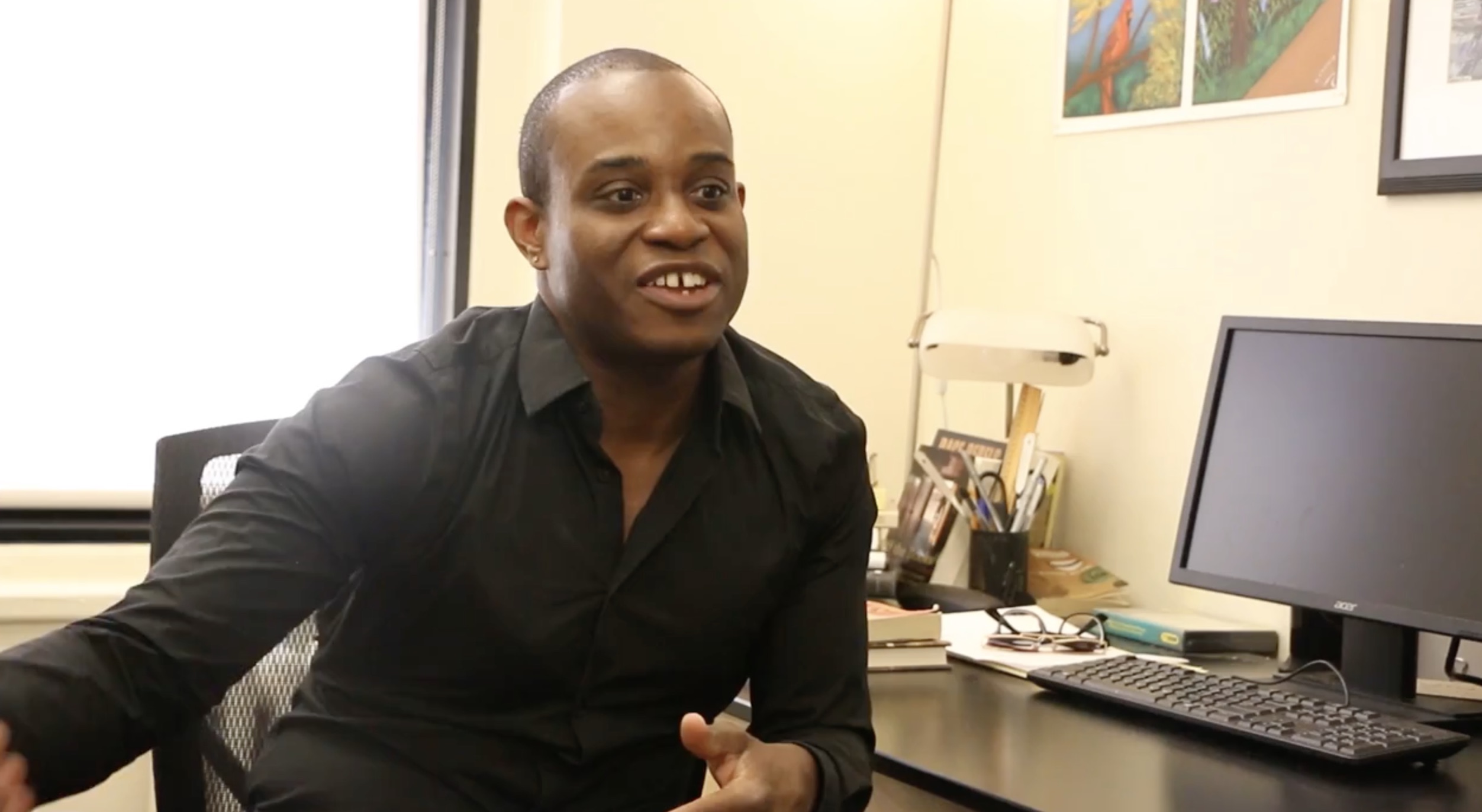Innocence Project’s Edwin Grimsley Shares a Decade of Wrongful Conviction Knowledge
08.16.16 By Innocence Staff
Over the course of 10 years, Innocence Project Senior Case Analyst Edwin Grimsley has reviewed thousands of letters from people in prison who have contacted the Innocence Project, trying to prove their innocence. He’s been a liaison of sorts for people in prison and Innocence Project lawyers, skillfully combing through court and police documents to determine if DNA can prove defendants’ innocence and then recommending the strongest cases to the legal team to take on. Grimsley conceived the theories for which DNA testing could prove innocence in five wrongful convictions, including that of Nathan Brown who was freed in 2014. Nathan spent 17 years of wrongful incarceration in Louisiana.
Grimsley has also spent countless hours conducting his own research on how black men and black youth are disproportionately wrongly convicted. He led the effort toward more conversations about the effects of racial biases in wrongful convictions by writing blog pieces and conducting interviews with talk radio and magazines. After contributing a decade of outstanding work at the Innocence Project, he will continue to follow his passion for fixing the flaws in the criminal justice system by earning a Ph.D. in sociology with a focus on race and policing.
Edwin shares highlights from his time at the Innocence Project and an excellent syllabus on wrongful conviction.
Edwin’s Multimedia Wrongful Conviction Syllabus
History: How did we get here in the first place?
Discipline and Punishment: The Birth of Prisons by Michel Foucault
American Apartheid: Segregation and the Making of the Underclass by Douglas Massey
Worse Than Slavery: Parchman Farm and the Ordeal of Jim Crow Justice by David Oshinsky
The Condemnation of Blackness: Race, Crime, and the Making of Modern Urban America by Khalil Gibran Muhammad
“The Case for Reparations” by Ta-Nehisi Coates (The Atlantic, June 2014 issue)
The Age of Jim Crow by Jane Dailey
The Fire Next Time by James Baldwin
“Slavery to Mass Incarceration” by Equal Justice Initiative (Youtube)
Introduction to mass incarceration
The New Jim Crow: Mass Incarceration in the Age of Colorblindness by Michelle Alexander
From the War on Poverty to the War on Crime: The Making of Mass Incarceration in America by Elizabeth Hinton
Caught: The Prison State and the Lockdown of American Politics by Marie Gottschalk
The First Civil Right: How Liberals Built Prison America by Naomi Murakawa
Just Mercy: A Story of Justice and Redemption by Bryan Stevenson
Inside: Life Behind Bars in America by Michael Santos
The House I Live In (2012 Documentary)
Wrongful conviction
Convicting the Innocent: Where Criminal Prosecutions Go Wrong by Brandon L. Garrett
False Justice: Eight Myths That Convict the Innocent by Jim Petro and Nancy Petro
In Doubt: The Psychology of the Criminal Justice Process by Dan Simon
True Stories of False Confessions Edited by Rob Warden and Steven A. Drizin
The Death of Innocents: An Eyewitness Account of Wrongful Executions by Helen Prejean
Stolen Years: Stories of the Wrongfully Imprisoned by Reuven Fenton
Exoneree Diaries: The Fight for Innocence, Independence, and Identity by Alison Flowers
Chasing Justice: My Story of Freeing Myself After Two Decades on Death Row for a Crime I Didn’t Commit by Kerry Max Cook
An Expendable Man: The Near-Execution of Earl Washington, Jr. by Margaret Edds
Picking Cotton: Our Memoir of Injustice and Redemption” by Ronald Cotton and Jennifer Thompson-Cannino, with Erin Torneo
Exit to Freedom by Calvin Johnson, with Greg Hampikian of the Idaho Innocence Project
The Trials of Darryl Hunt by Annie Sundberg and Ricki Stern (HBO Documentary, 2006)
The Central Park Five by Ken Burns, Sarah Burns, David Mcmahon (Documentary, 2012)
The Wrong Guys: Murder, False Confessions, and the Norfolk Four by Tom Wells and Richard Leo
Journey Toward Justice by Dennis Fritz
Race and wrongful conviction
Arresting Citizenship: The Democratic Consequences of American Crime Control by Amy E. Lerman and Vesla M. Weaver
Race and Justice: Wrongful Convictions of African American Men by Marvin D. Free Jr. and Mitch Ruesink
Tulia: Race, Cocaine, and Corruption in a Small Texas Town by Nate Blakeslee
“Before the Law” by Jennifer Gonnerman (The New Yorker, October 6, 2014)
“What Wrongful Convictions Teach Us About Racial Inequality” (Innocence Blog) by Edwin Grimsley
“African American Wrongful Convictions Today” (Innocence Blog) by Edwin Grimsley
“Lessons about Black Youth and Wrongful Convictions: Three Things You Should Know” (Innocence Blog) by Edwin Grimsley
Women and wrongful conviction
Wrongful Convictions of Women: When Innocence Isn’t Enough by Jr., Marvin D. Free and Mitch Ruesink
Inner Lives: Voices of African American Women in Prison by Paula C. Johnson
“Death, But Is It Murder? The Role of Stereotypes and Cultural Perceptions in the Wrongful Convictions of Women” by Andrea L. Lewis & Sara L. Sommervold (Albany Law Review, June 2015)
Solutions
Locked Down, Locked Out: Why Prison Doesn’t Work and How We Can Do Better by Maya Schenwar
Let’s Get Free, A Hip-Hop Theory of Justice by Paul Butler
Related: Meet the team that reads thousands of letters from people fighting to prove innocence
Leave a Reply
Thank you for visiting us. You can learn more about how we consider cases here. Please avoid sharing any personal information in the comments below and join us in making this a hate-speech free and safe space for everyone.
September 18, 2019 at 9:43 pm
September 27, 2016 at 12:22 am
Awesome work!!! God bless you all

I have read many of the books listed in this article. They have all been moving and emotionally challenging stories. I quote them in discussions, suggest others read them, and share the books I own. Kamala Harris thrilled me with her promise to end the death penalty, just sorry she is not leading the Democrat pack for the Presidency. This list of books is appreciated as I continue to read these tragic, but hopeful stories and experiences. Thank you.